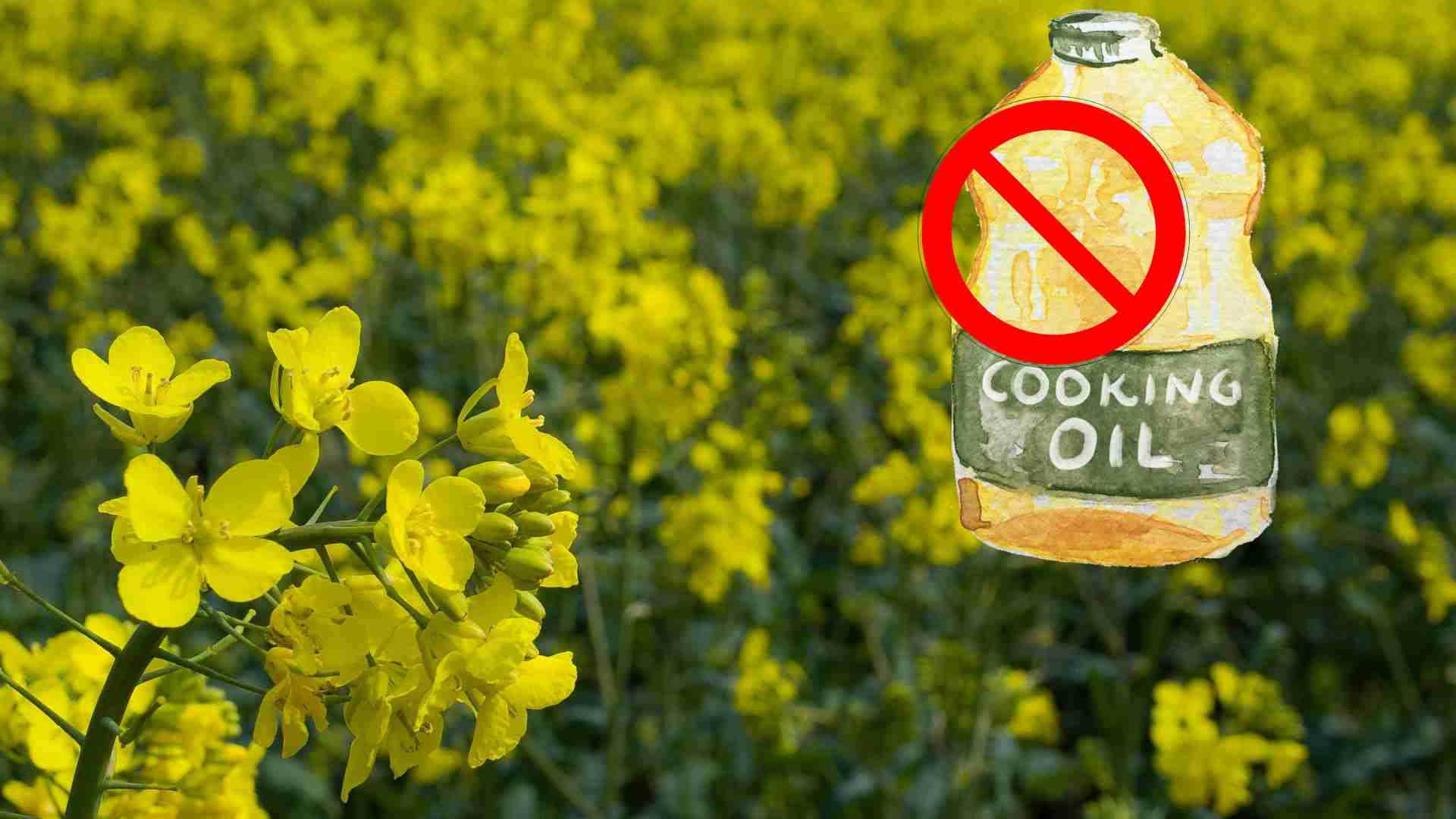Why is canola oil banned in Europe?

Do you want to know why is canola oil banned in Europe? The reason why is canola oil banned in Europe is pretty unclear. According to some reports, it is made up of hexane, an element that is present in more than ten percent of the oil market in Europe. According to a different source, canola oil production requires quite a lot of water and land.
Canola oil’s biggest disadvantage is the excessive Erucic acid amount. Erucic acid is believed to be related to a number of health issues, including heart attacks. However, is it truly illegal in Europe, or is it simply a myth? Continue reading to find out the answers to all of your questions or concerns.
What is canola oil?

Canola oil also known as Rapeseed oil is a particular kind of vegetable oil resulting from the seed pods of the canola plant. It was created in the 1970s through the use of common plant breeding procedures. The brassica family is also a member of the canola plant which includes Brussels sprouts, Broccoli, and cabbage. It is a well-known cooking and baking oil due to its neutral flavor and high flame point.
Canola oil is high in polyunsaturated as well as monounsaturated fats and low in saturated fat. As a result, it is a highly adaptable element in the cooking. Canola oil offers a lot of health benefits. It is not high in fat oil but also happens to be high in antioxidants. Furthermore, canola oil might help to manage blood sugar levels and lower the chance of diabetes. Some oils are informed to have 0% Trans fats. However this is technically correct, most oils do contain some trans-fat.
Cooking with canola oil

Canola oil is one of the most famous cooking oils due to its smooth texture, light flavor, and high smoke point. It can also use in many different kinds of meals and cooking methods, including:
- Salad dressings, sauces, and marinades as well, for example.
- Instead of adding solid fats (like margarine or butter) in recipes
- As a frying, stir-frying, baking oil, and grilling.
- To set up your baking pans for nonstick baking
Alternatives of canola oil

If you are not sure about canola oil, you can try some different alternatives. There are many different oils that you can use in cooking instead of canola oil. These oils include:
- Olive oil
- Coconut oil
- Sesame oil
- Avocado oil
For salad dressing or uncooked food try:
- Walnut oil
- Flaxseed oil
- Hemp seed oil
Nutrition of Canola oil

On top of that to be extremely high in omega-3 (ω-3) fats (9%-11%), canola oil is also high in monounsaturated fatty acids (63%), which are consider to be a beneficial healthy fat.
Furthermore, canola oil includes considerable levels of phytosterols (approximately 0.9% by weight) that prevent cholesterol absorption in the tissues of the human body. Canola oil has the lowest saturated fat level as compared to the other oils. Such as:
- Coconut oil consists of 90% saturated fat
- Olive oil consists of 14% saturated fat
- Avocado oil consists of 14% saturated fat
- Corn oil consists of 13% saturated fat
- Sunflower oil consists of 9% saturated fat
- Canola oil consists of 7% saturated fat
Dangers of canola oil
What are the dangers of canola oil? However, there may be no absolute answer to that question. The major problem with Canola oil is its high Erucic acid quantity. Erucic acid is a kind of fatty acid associated with heart disease and other health issues. Some dangers of the canola oils are given below:
- Genetically Modified Product
- Canola oil is Hydrogenate oil
- Increased Risk of Developing Cancer
- Contributes to Heart Disease
Why is canola oil banned in Europe?

A number of people believe that canola oil cannot be produced in Europe. Probably this is due to a rumor that started spreading online the previous year. Why is canola oil banned in Europe? According to the general opinion, Canola oil is not banned in Europe, although there is no proof that canola oil is harmful to health or causes cancer. In fact, the EU is a world leader in rapeseed production.
The European Union (EU) governments produce more canola than Canada altogether. The plant is commonly spoken of to as “oilseed rape” in Europe and the oil is known as “rape oil” or “rapeseed oil”. However, this is simply another term for canola.
Canola oil has a neutral flavor, making it a great option for baking. Canola oil has turned into one of the world’s best-known oils. A further reason why people assume canola oil is banned in Europe is that it is frequently genetically plotted. It is important to remember, however, that many of the foods we eat on a daily basis are genetically plotted and aren’t thought to be dangerous. In actuality, genetic plotting is frequently used to make food more nutritious and safer.
Should you avoid canola oil?
You must be heard that canola oil has been accused of being poisonous or harmful. However these claims have been made in the past and for now it is completely safe to consume and it causes no health risk.
Canola oil or any other vegetable oil must be prepared and processed with care. Canola oil is a safe and healthful kind of fat that reduces heart disease risk and blood LDL cholesterol levels when compared to carbs or saturated fats found in butter or beef.
Frequently Asked Questions
Q: Why is canola oil banned in Europe?
According to the reports, the European Union (EU) banned canola oil because it is unsafe and toxic. However, this is just a myth, because canola oil is not banned in Europe.
Q: Why does canola oil have been a bad reputation?
Canola oil has a negative image since the majority of canola plants farmed in Canada have been genetically modified to be chemical resistant. Furthermore, genetically modified organisms (GMOs) have caused a lot of concern.
Q: What is the side effect of canola oil?
Because canola oil is slightly hydrogenated, it has the potential to promote blood vessel irritation and plaque. Canola oil consumption on a regular basis may cause memory problems. The presence of omega-3 fatty acids could increase the bleeding period.
Q: Is canola oil worse for you than vegetable oil?
Without a doubt, canola oil is much lower in saturated fatty acid than any other vegetable oil. So, this makes canola oil to be a better healthier option for cooking.
Q: Is canola oil banned in England?
The simple answer is a big NO. The canola oil is not banned in England.
Conclusion:
Why is canola oil banned in Europe? I hope you must be got your answer. Canola oil is not banned in Europe. As a result of its low cholesterol level and neutral flavor, it is a popular cooking ingredient. Furthermore, canola oil is high in omega-3 fatty acids, which have been shown to lower the risk of stroke, heart disease, and other long-term medical disorders.

